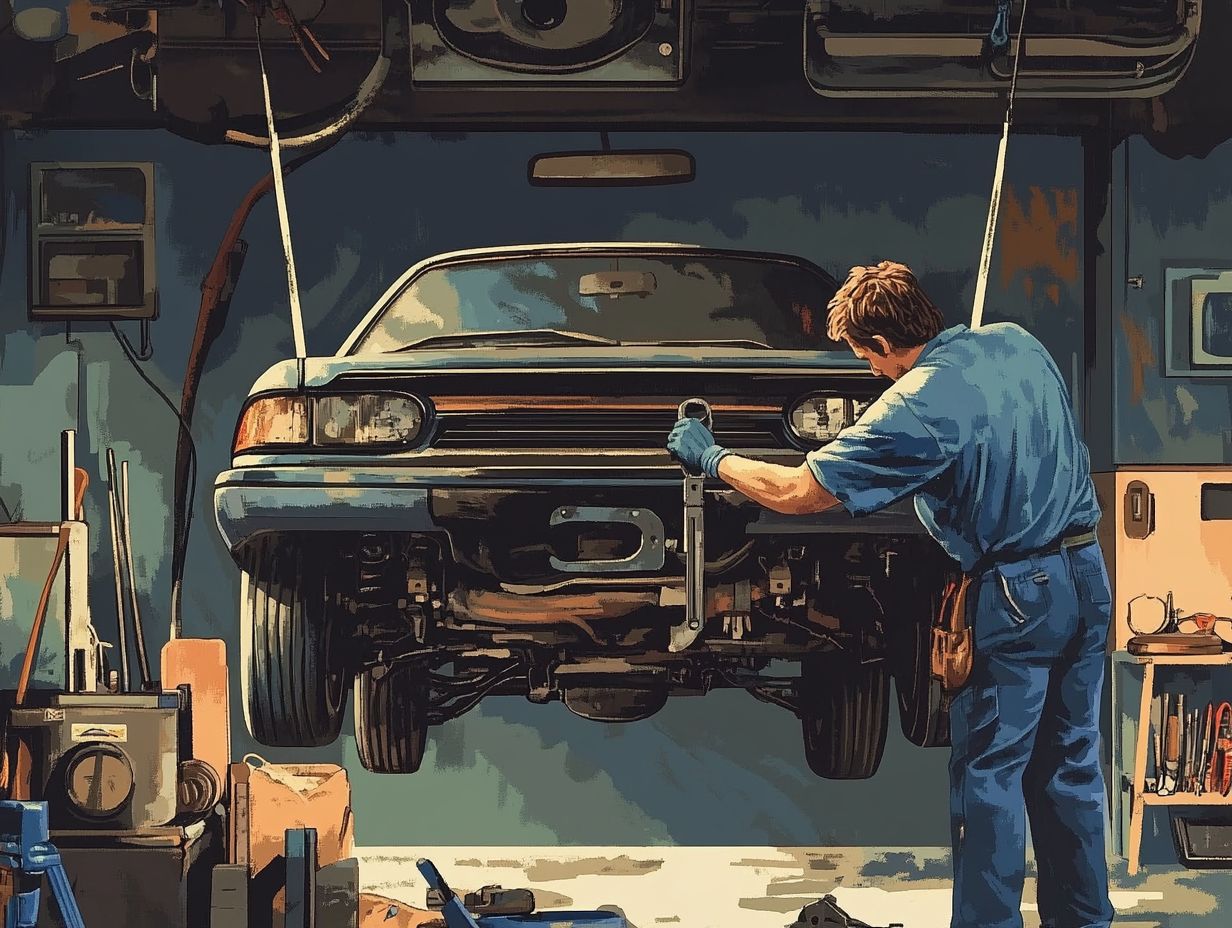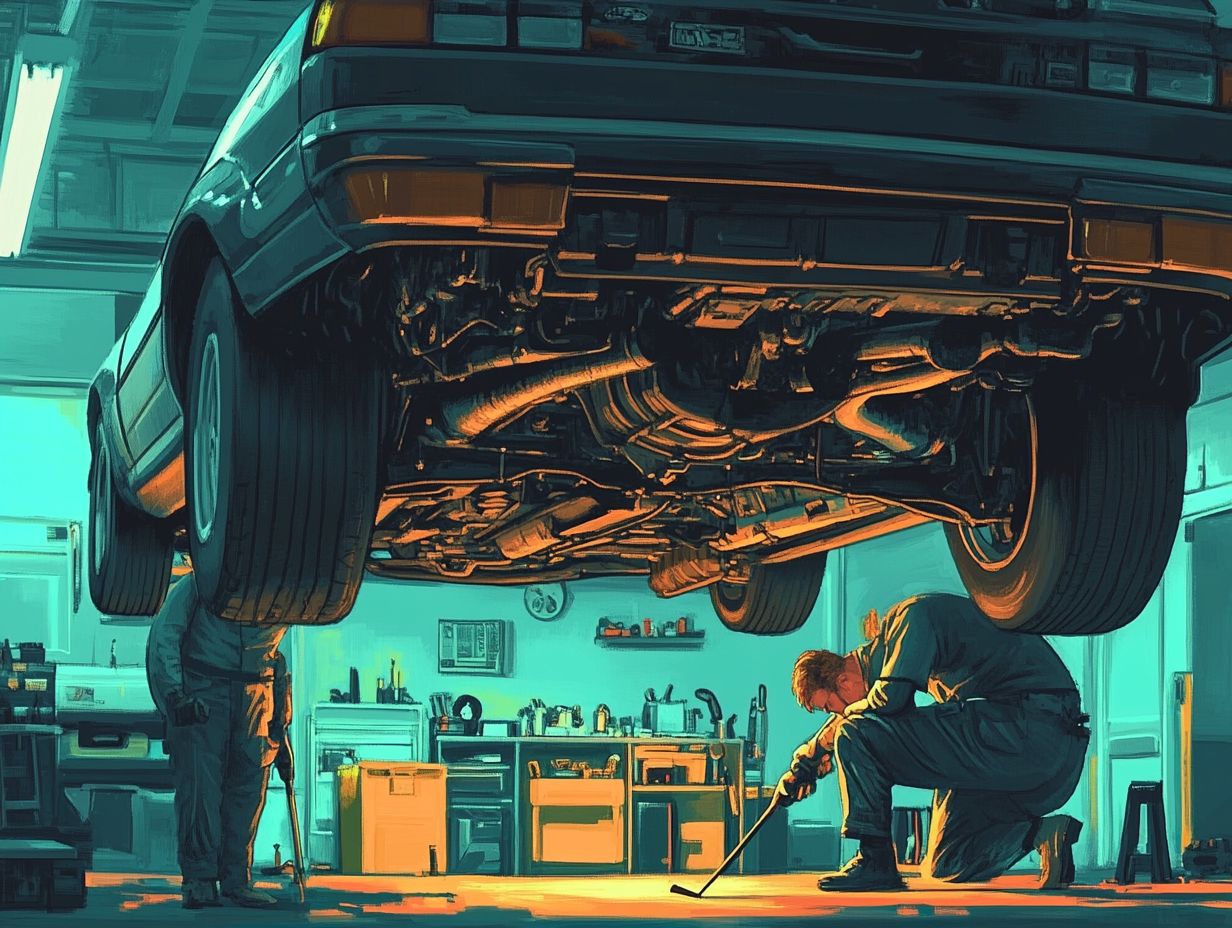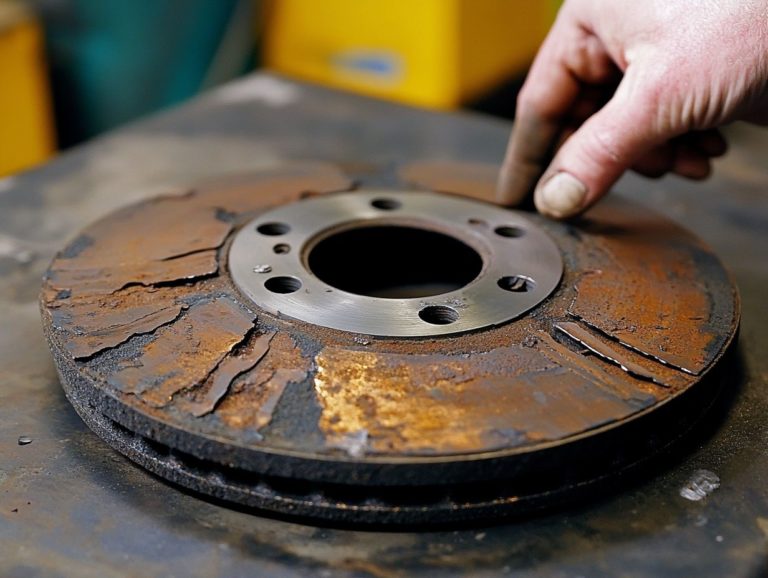Tips for Maintaining Your Car’s Exhaust System
Contents
- Your Car’s Exhaust System: Why It Matters
- Key Takeaways:
- The Importance of Maintaining Your Car’s Exhaust System
- Signs of Exhaust System Problems
- Regular Maintenance for Your Exhaust System
- Essential DIY Tips to Keep Your Exhaust System Healthy!
- Professional Services for Exhaust System Maintenance
- Preventing Exhaust System Issues
- Frequently Asked Questions
- What are some tips for maintaining your car’s exhaust system?
- How can I prevent my exhaust system from rusting?
- Is it necessary to replace my entire exhaust system if I notice a problem?
- How often should I have my exhaust system checked?
- What can happen if I neglect to maintain my exhaust system?
- Can I maintain my car’s exhaust system on my own?
Your Car’s Exhaust System: Why It Matters
Don t let exhaust problems sneak up on you! Your car’s exhaust system is essential for both the best performance of your car s engine and minimizing environmental impact, yet it often slips under the radar.
A well-functioning exhaust system boosts your vehicle’s efficiency and plays a vital role in reducing harmful emissions.
This article explores the telltale signs of potential exhaust issues, the importance of regular maintenance, and offers straightforward DIY tips to keep your system in prime condition.
You ll also find guidance on when it s time to call in the professionals, along with preventive measures to help you sidestep costly repairs.
Keep reading to ensure your ride remains smooth and eco-friendly!
Key Takeaways:

- Regular maintenance is crucial for a healthy exhaust system, as it affects your car’s performance and fuel efficiency.
- Look out for warning signs like strange noises and reduced engine power to catch exhaust system issues early.
- Simple DIY steps like checking for leaks and cleaning the exhaust pipes can help prevent costly repairs in the long run.
The Importance of Maintaining Your Car’s Exhaust System
Maintaining your car’s exhaust system is crucial for ensuring the best performance of your car s engine, enhancing fuel efficiency, and minimizing harmful emissions. A properly functioning exhaust system is not just about controlling toxic gases; it also significantly contributes to your vehicle’s longevity and overall driving experience.
By committing to regular maintenance, you can prevent costly repairs and ensure that every exhaust component like the catalytic converter (a device that reduces harmful emissions) and oxygen sensor (which measures the amount of oxygen in the exhaust) is in excellent shape, ultimately fostering a safer environment.
Prioritizing the care of your exhaust system helps you sidestep potential pitfalls like exhaust leaks and muffler noise, which could escalate into more serious engine issues down the line.
Why a Healthy Exhaust System Matters
A healthy exhaust system is essential for achieving the best performance of your car s engine and fuel efficiency, as it significantly reduces emissions of harmful gases.
A well-maintained exhaust system lets your engine breathe more freely, leading to more efficient combustion. This means you ll not only see a decrease in harmful pollutants, but you ll also enjoy enhanced throttle response and acceleration.
By prioritizing your exhaust system, you’re making a conscious choice to lower fuel consumption, allowing your engine to operate more smoothly. Investing in routine maintenance paves the way for long-term benefits, including improved fuel economy and a more enjoyable driving experience, as your vehicle runs cleaner and more powerfully.
Signs of Exhaust System Problems
Recognizing the early signs of exhaust system issues can spare you from expensive repairs and ensure your vehicle runs both safely and efficiently. You might notice common symptoms such as strange muffler noises, exhaust leaks, or visible corrosion on exhaust components.
If any of these red flags arise, it s crucial to perform a comprehensive visual inspection. Addressing the root cause promptly will prevent the situation from escalating into more serious engine problems.
Common Symptoms and Warning Signs
Common symptoms of exhaust system issues include unexpected muffler noise and exhaust leaks, both of which can directly impact your engine s performance. These signs often indicate that your vehicle’s exhaust system isn t functioning properly, potentially leading to more serious problems if left unaddressed.
If you’re hearing excessive noise from the muffler, it may signal internal damage or a blockage, hindering exhaust flow. This can affect the engine control unit’s ability to effectively regulate air-fuel mixtures. An exhaust leak doesn t just compromise your vehicle s efficiency by allowing harmful gases to escape; it may also trigger the check engine light, urging you to seek immediate inspection.
Ignoring these warning signs could lead to diminished fuel efficiency and costly repairs, emphasizing the crucial nature of timely diagnostics and repairs.
Regular Maintenance for Your Exhaust System

Establishing a regular maintenance routine for your exhaust system is essential for ensuring its longevity and optimal performance. Scheduled inspections should thoroughly examine all exhaust components, including the catalytic converter, which helps reduce harmful emissions, the exhaust pipe, and the muffler.
This proactive approach allows you to identify wear and tear before they escalate into costly repairs. By prioritizing vehicle upkeep, you enhance your car’s reliability and fuel efficiency while minimizing potential exhaust issues down the road.
Recommended Maintenance Schedule
A recommended maintenance schedule for your exhaust system involves regular inspections every 12,000 miles or according to your vehicle’s manual.
During these inspections, it s essential to conduct a thorough assessment of various components that play a critical role in the exhaust system’s overall functionality. This means checking for rust, as it can hinder performance and lead to unsightly leaks.
You should also ensure that the oxygen sensor is functioning properly since this directly affects fuel efficiency and emission levels. A mechanic should also check the exhaust manifold for any cracks or damage that could impair engine performance.
By following these best practices, you can maintain optimal performance and significantly extend the lifespan of your exhaust system.
Essential DIY Tips to Keep Your Exhaust System Healthy!
Conducting regular DIY checks enables you to maintain your exhaust system with finesse, ensuring both longevity and optimal performance.
Simple tasks like cleaning the exhaust, visually inspecting for signs of rust or corrosion, and verifying that the tailpipe functions properly can significantly prevent larger issues from arising in the future.
By weaving these practices into your vehicle maintenance routine, you proactively safeguard your exhaust system from damage and elevate its efficiency.
Simple Steps to Keep Your Exhaust System in Good Condition
To maintain your exhaust system in top-notch condition, embrace a few straightforward practices like conducting regular visual inspections, cleaning exhaust components, and promptly addressing any signs of wear. These steps are essential for ensuring your system performs optimally and lasts longer.
- Begin by inspecting visible parts, such as the muffler and pipes, for any signs of rust, cracks, or loose connections.
- A clean exhaust system is vital for minimizing harmful emissions, so never underestimate the importance of routine cleaning.
- Regarding wear, pay special attention to rubber mounts and gaskets, as these can deteriorate over time.
- If you re a DIY enthusiast, listen for unusual noises or smells; they could signal underlying issues.
Acting now can save you from expensive repairs later, allowing your vehicle to run s smoothly and efficiently for years to come.
Professional Services for Exhaust System Maintenance
Engaging professional services for exhaust system maintenance is essential for achieving thorough diagnostics and repairs that DIY efforts might overlook. Skilled mechanics at specialized service centers can conduct comprehensive inspections, utilizing advanced diagnostic tools to pinpoint issues accurately and execute necessary repairs. This helps prevent costly future problems.
When you encounter symptoms such as excessive muffler noise or exhaust leaks, turning to the expertise of exhaust specialists can ultimately save you both time and money on repairs in the long run.
When to Seek Professional Help

Don’t ignore engine problems! Seeking professional help can save you time and money when you notice persistent engine issues, unexplained exhaust leaks, or unusual noises from the exhaust system.
These symptoms can hint at deeper mechanical concerns that require timely intervention. If the check engine light stubbornly remains lit despite your best efforts with minor fixes, it may indicate the need for a complete engine check.
Erratic performance or dwindling fuel efficiency often points to underlying faults that might go unnoticed without a seasoned mechanic’s expert eye.
By addressing these symptoms quickly, you extend the lifespan of your vehicle and create safer driving conditions. A professional’s experience is invaluable in pinpointing the root cause of these troubling signs, ensuring the right repairs are made to restore optimal function.
Preventing Exhaust System Issues
Preventing exhaust system issues requires you to establish a consistent maintenance routine while being mindful of your driving habits. Both play a significant role in exhaust efficiency.
You must take action now to extend the lifespan of your exhaust components and maintain optimal engine performance. Practicing diligent exhaust care and taking proactive measures to prevent rust contribute to a cleaner environment by reducing harmful emissions.
Tips for Avoiding Common Problems
To steer clear of common exhaust system issues, embrace good driving habits, conduct regular inspections, and follow essential maintenance tips.
Being mindful of how you accelerate and decelerate can significantly reduce strain on your exhaust system. This ultimately prolongs the life of key components like the catalytic converter a device that helps reduce harmful emissions and the muffler.
Scheduling routine checks allows you to catch potential problems, such as leaks or rust, before they develop into costly repairs. Regular oil changes and maintaining proper tire pressure not only enhance fuel efficiency but also minimize harmful emissions.
This proactive approach, rooted in preventive care and consistent maintenance, safeguards the integrity of your exhaust system and contributes to a cleaner environment.
Watch this video for quick tips on maintaining your exhaust system.
Frequently Asked Questions
What are some tips for maintaining your car’s exhaust system?
- Regularly check for any leaks or damage in the exhaust system, especially around the joints and connections.
- Get your exhaust system inspected by a professional mechanic every year or every 10,000 miles.
- Use high-quality fuel to prevent buildup of deposits and reduce the risk of clogs.
- Avoid driving over rough roads or hitting potholes, as this can damage the exhaust system.
- Replace your exhaust system’s oxygen sensor every 60,000 miles to maintain proper fuel efficiency.
- Keep an eye out for any unusual noises or vibrations coming from your car’s exhaust system, and address them immediately.
How can I prevent my exhaust system from rusting?

- Avoid driving through deep puddles or standing water, as it can cause rust to form on the exhaust system.
- Wash your car regularly to remove any salt or chemicals that may cause rust.
- Use anti-rust sprays or coatings on your exhaust system to protect it from corrosion.
- Park your car in a garage or covered area to shield it from the elements.
Is it necessary to replace my entire exhaust system if I notice a problem?
Not necessarily. If the issue is minor, such as a small leak or damaged muffler, it can often be fixed without replacing the entire system. However, if the problem is more severe, it may be more cost-effective to replace the entire system rather than attempting to fix it.
How often should I have my exhaust system checked?
It is recommended to have your exhaust system inspected by a professional mechanic at least once a year or every 10,000 miles. However, if you notice any unusual noises or vibrations, it is important to have it checked immediately.
What can happen if I neglect to maintain my exhaust system?
Neglecting your exhaust system can lead to serious issues. These include reduced fuel efficiency, engine misfires, and potential damage to other car parts.
Don’t wait until it’s too late! Taking care of your exhaust system could save you from expensive repairs and keep you safe on the road.
Can I maintain my car’s exhaust system on my own?
Car owners can perform simple tasks like visual inspections or replacing the oxygen sensor. An oxygen sensor monitors the level of oxygen in your car’s exhaust and helps improve fuel efficiency.
It’s safer to leave complex repairs to a professional mechanic. Want to keep your car running smoothly? Taking on simple tasks yourself can be rewarding, but remember, complex issues are best left to the experts!






